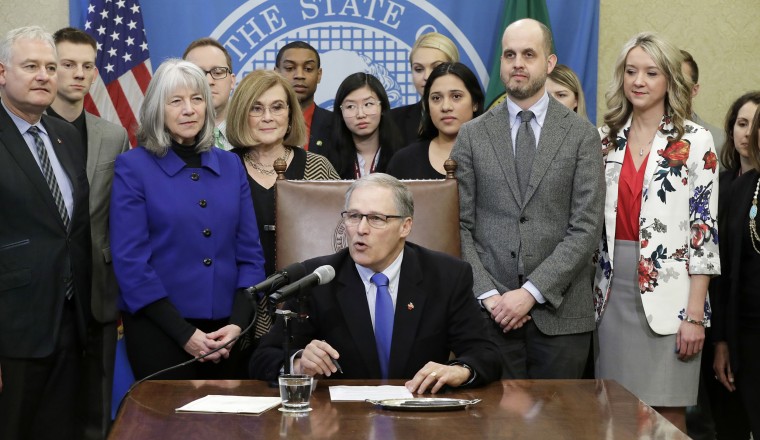Net neutrality is dead at the federal level, but a push to revive it at the state level continues to gain traction.
Washington on Monday became the first state to pass a law making it illegal for internet service providers to manipulate their networks for money.
Dozens of other states are considering similar measures through legislation and lawsuits. Governors in Montana, Hawaii, New York, New Jersey and Vermont have all signed executive orders on the issue.
"Internet service providers otherwise could limit what websites or apps you would be able to use," Washington Gov. Jay Inslee, a Democrat, said at the signing on Monday. "They could slow down your use and access unless you use their preferred apps or their chosen services."
"We are here to say Washingtonians will be protected from throttling, from fast lanes, and they will be protected in preserving an open and accessible internet," he added.
There's just one problem: The new rules passed by the Federal Communications Commission in December, in a 3-2 vote along party lines, pre-empt states from making their own net neutrality laws.
The FCC's new rules will officially go into effect on April 23, according to a notice published last month in the Federal Register. Washington's law, which had bipartisan support, doesn't take effect until June 6. Experts expect it could face legal challenges.
"This is symbolic politics, because the states know it is illegal to do," Roslyn Layton, a visiting scholar at the American Enterprise Institute, told NBC News. "But they can put rules on the book and make it look like they're doing something."
The FCC is already embroiled in a variety of lawsuits related to its rollback of net neutrality rules, including an effort from 21 state attorneys general to get a court to block the FCC's move.
Layton said there's a reason why the policy making for internet regulation is at the federal level, and said she doesn't see a practical solution coming from the states.
"It is not practical to have 50 sets of internet rules. It's untenable," she said. "Imagine if Amazon had to go to each state to set up a network."
Come April, and barring any major legal action, the internet will return to being classified as a Title I information service, giving internet service providers (ISPs) more leeway to create so-called internet fast and slow lanes, as long as they publicly disclose their practices.
What could happen next is a bit murky. Experts agree it's likely internet service providers could file a lawsuit against the states and the clash could play out in the courts.
But "it does not seem clear how the courts will view these actions," Michael Fauscette, chief research officer at G2 Crowd and a former analyst who has written on net neutrality, said.
While the clock is ticking on net neutrality, advocates say the fight is far from over. In fact, they're hopeful and ready for an inevitable day in court.
Evan Greer, deputy director of Fight For the Future, a digital rights advocacy group, said she believes net neutrality supporters will come out victorious in a legal battle.
"Ajit Pai, the former Verizon lawyer now in charge of the FCC, blatantly ignored the voices of tech experts — and millions of people from across the political spectrum — and instead based his rulemaking almost entirely on debunked studies funded by the telecom industry," she wrote in an op-ed for NBC News. "His agency was also caught ignoring serious issues of fraud with the agency’s public comment process, despite the fact that 98 percent of the unique comments submitted opposed his plan."
Layton said different rules in the 50 states will be bad for consumers and for business.
"The reason why we had the great internet success that we did [before the 2015 rules] is because we had one federal policy to get it going," she said.
